#841 Frank Barnard’s coach & mail
Stagecoach North: A History of Barnard’s Express
by Ken Mather
Victoria: Heritage House, 2020
$22.95 / 9781772033090
Reviewed by Matthew Downey
*
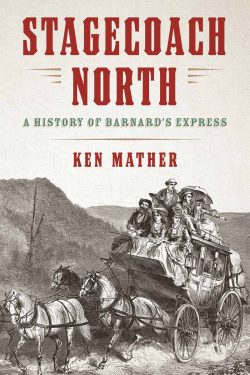 Ken Mather’s chronicle of Barnard’s Express, the company that carried freight and passengers between coastal and interior British Columbia during the gold rush years of the mid to late 19th century, connects the biography of one man and his enterprise to the foundational history of the province. Just as Francis Jones Barnard (1829-1889) made far-flung frontier towns and smaller settlements accessible to prospective gold miners in mid-Victorian BC, so Mather, in Stagecoach North: A History of Barnard’s Express, makes BC’s mythic gold rush history alive and real to us today. Mather situates Frank Barnard and his cohorts in the establishment and evolution of colonial BC. Despite some stylistic awkwardness, Mather achieves an engaging balance between conveying the exciting and legendary aspects of Barnard’s Express alongside a more sober scholarly foundation based on extensive archival research.
Ken Mather’s chronicle of Barnard’s Express, the company that carried freight and passengers between coastal and interior British Columbia during the gold rush years of the mid to late 19th century, connects the biography of one man and his enterprise to the foundational history of the province. Just as Francis Jones Barnard (1829-1889) made far-flung frontier towns and smaller settlements accessible to prospective gold miners in mid-Victorian BC, so Mather, in Stagecoach North: A History of Barnard’s Express, makes BC’s mythic gold rush history alive and real to us today. Mather situates Frank Barnard and his cohorts in the establishment and evolution of colonial BC. Despite some stylistic awkwardness, Mather achieves an engaging balance between conveying the exciting and legendary aspects of Barnard’s Express alongside a more sober scholarly foundation based on extensive archival research.

For many people in this province like myself, who grew up driving down Highways 1 and 97 in a matter of days, the thought of a time when it took a week or more to reach the Cariboo District from the coast conjures up a distant and archaic past. For the modern traveller, the challenges of road construction and communication between coast and interior hardly even come to mind. For F.J Barnard in the early 1860s, navigating just a portion of that expanse was an exceptional hardship. His progress in finding faster and more efficient ways to carry animate and inanimate cargo from Victoria and New Westminster to the gold-rich Cariboo parallels the development of the region. As Mather shows, Barnard’s company was an active participant in the colonial project.
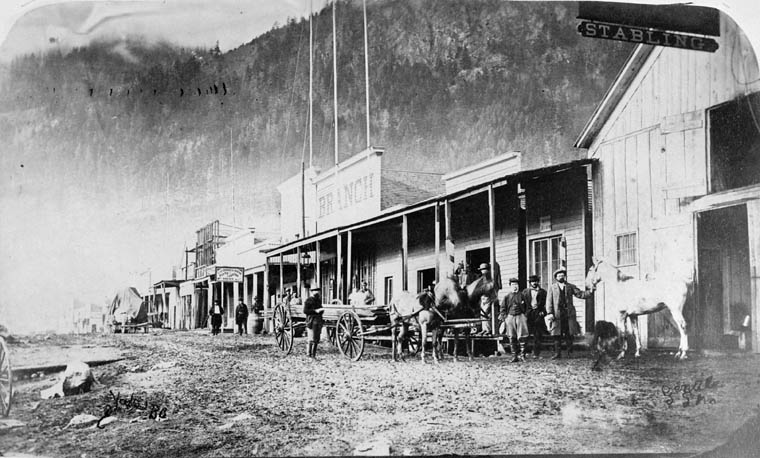

As an entrepreneur, Quebec-born Barnard’s success depended on the help he received from Her Majesty’s government through mail-carrying contracts. Mather emphasizes the separate yet mutually beneficial relationship between private and governmental agents in the process of colonization. Governors James Douglas and Frederick Seymour had largely failed in their own attempts to organise the transportation of mail and freight effectively, and accordingly lost business to private express companies (p. 7).
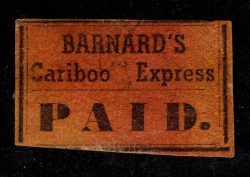 However, it was the awarding of a Royal Mail contract to Barnard that gave him the advantage over other private competitors (p. 259). Through such selective sponsorship, the government promoted the success of British colonial businesses over American companies, such as Barnard’s early rival Billy Ballou. The story of Ballou’s company, told early in Stagecoach North, portrays a struggle between British colonial expectations and opportunistic Americans in BC’s gold rush era. Through his mail contract Barnard, a Canadian, gained a monopoly of the express postal service to the Cariboo. Similarly, it was the loss of that mail contract that brought about the dissolution of Barnard’s company in 1921. Mather does an excellent job of establishing the nature of colonial policies to show how private business and government worked hand in hand to maintain the transport and communication structure that promoted peace and order during the tumultuous gold rush years.
However, it was the awarding of a Royal Mail contract to Barnard that gave him the advantage over other private competitors (p. 259). Through such selective sponsorship, the government promoted the success of British colonial businesses over American companies, such as Barnard’s early rival Billy Ballou. The story of Ballou’s company, told early in Stagecoach North, portrays a struggle between British colonial expectations and opportunistic Americans in BC’s gold rush era. Through his mail contract Barnard, a Canadian, gained a monopoly of the express postal service to the Cariboo. Similarly, it was the loss of that mail contract that brought about the dissolution of Barnard’s company in 1921. Mather does an excellent job of establishing the nature of colonial policies to show how private business and government worked hand in hand to maintain the transport and communication structure that promoted peace and order during the tumultuous gold rush years.
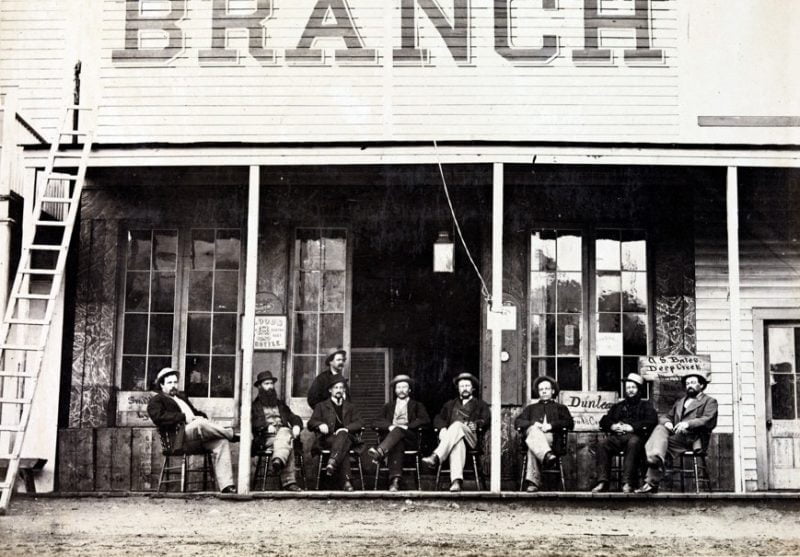
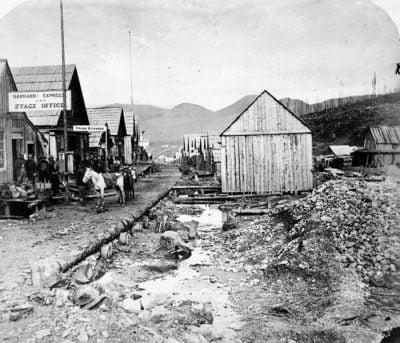
Mather’s aim (p. 4) is to provide the most accurate story of Barnard and his company to date, and Stagecoach North succeeds in this. He devotes extensive detail to extraordinary events such the horse-drive up from Southern California by Steve Tingley, a “crack whip” stagecoach driver and later company owner. When business records are available, Mather gives the exact number of horses purchased; and when — as Tingley’s journey progressed northwards — records are spare, save for his diary, Mather gives a close estimate derived from calculations of losses (pp. 131-133).
Indeed, Mather’s record of such minute details makes Stagecoach North a reliable and solid history of Barnard’s company. His attention to factual details provides a view of exactly what the company did, their impact on contemporary events, and their geographical reach; it was 650 km over the Cariboo Road from Yale to Barkerville. Mather lays out the achievements and failures of Barnard’s Express along with anecdotes derived from the experiences of customers and employees alike. Often humorous, such anecdotes offer a taste of the more relatable human aspects of history. The benefits of Mather’s extensive curatorial and research roles in western Canada are apparent with such material. For example, Mather’s story of a lone female stagecoach passenger who gave birth during a stop at a roadhouse on a wintry road to Barkerville reminds the reader forcibly that there is more to corporate history than navigating business records and colonial policy (p. 128).
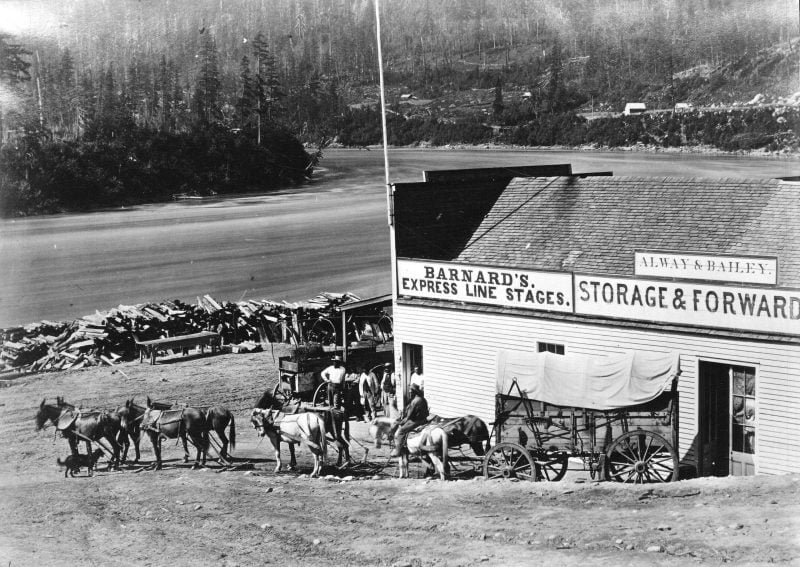

Despite the important purpose they serve in illustrating the humanity of history, these character-driven anecdotes also reveal Stagecoach North at its weakest. Tonally, some of Mather’s dialogue-heavy stories feel too much like an excerpt from a novel and out of place with the rest of the book, which otherwise has an air of objectivity and historical detachment. While admittedly usually brief, these stories, typically placed at the beginning of chapters, are at their most unsuitable when they contain artificial dialogue. One gets enough of a sense of the character of historical personages through their quoted writings; and in my view, unreferenced conversations and imaginary scenes in this context lack much benefit.
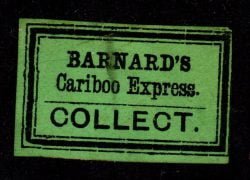 A second prominent issue with Mather’s writing is the number of times he introduces a character, place, or event. For example, J.B Leighton, a lifelong employee of the titular express company, is introduced twice (pp. 82, 137), on both occasions with a description of him living in Barkerville and being called “the boy.” However, Mather’s tendency to assume the reader has forgotten a name over the course of the book is not a major detraction and is only occasionally jarring.
A second prominent issue with Mather’s writing is the number of times he introduces a character, place, or event. For example, J.B Leighton, a lifelong employee of the titular express company, is introduced twice (pp. 82, 137), on both occasions with a description of him living in Barkerville and being called “the boy.” However, Mather’s tendency to assume the reader has forgotten a name over the course of the book is not a major detraction and is only occasionally jarring.


Despite these minor faults in style, Mather’s book is exceptional in its balanced and objective view of the history of F.J Barnard’s express company, and its role and influence in the development of the colony and then province of British Columbia. By connecting the interior boomtowns of the Cariboo gold rush with the older and far-distant coastal population and supply centres of New Westminster and Victoria, Mather argues convincingly that Barnard helped consolidate British colonial control in a sustainable way over a large tract of British Columbia. Mather also reveals that this entrepreneur had a large role in the union of the Colony of BC and the Dominion of Canada in 1871, alongside better-known figures like Amor De Cosmos and John Robson.
In sum, Stagecoach North is invaluable in shedding light and clarity on Barnard’s mythologised and under-examined contribution to BC’s gold rush history. In detailing the development of transportation northward through Barnard’s efforts, Mather allows for a newfound appreciation of this province’s 19th century history and geography.
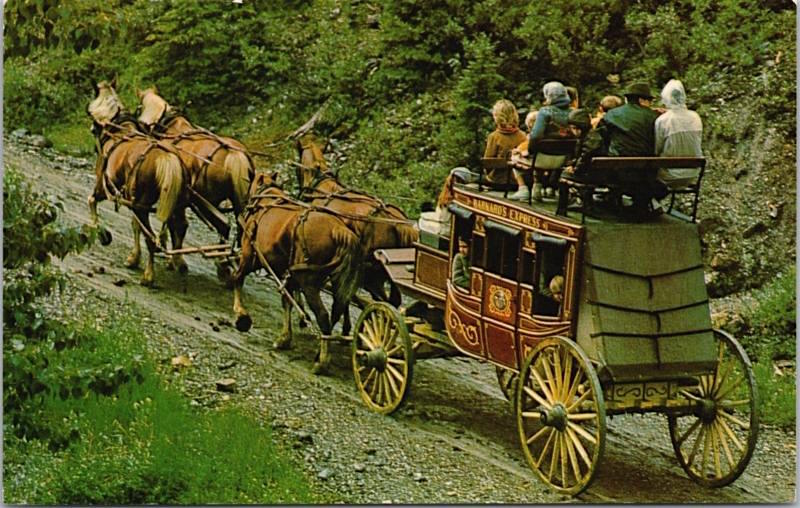
*

Matthew Vernon Downey is an honours student of History and Political Science at the University of Victoria. He currently lives in Victoria.
*
The Ormsby Review. More Books. More Reviews. More Often.
Publisher and Editor: Richard Mackie
The Ormsby Review is a journal service for in-depth coverage of B.C. books and authors. The Advisory Board consists of Jean Barman, Robin Fisher, Cole Harris, Wade Davis, Hugh Johnston, Patricia Roy, David Stouck, and Graeme Wynn. Scholarly Patron: SFU Graduate Liberal Studies. Honorary Patron: Yosef Wosk. Provincial Government Patron since September 2018: Creative BC
“Only connect.” – E.M. Forster
8 comments on “#841 Frank Barnard’s coach & mail”
I would love a copy. Where do I get one? The stage coach used to stop at my aunt’s place at 74 Mile house. We would visit and look in the floor boards of the barn for gold. Thanks.
Hi Beth, glad you’re interested! I would recommend asking for Ken Mather’s book at your local bookstore. And if you want to know what bookstores carry Ken Mather’s book, please contact Leslie at Heritage House, in Victoria. Her email address is in this link: https://www.heritagehouse.ca/contact-us/ I hope this helps! Richard
I want one too! Can I get it on amazon?
Hi Paul, I think it’s very likely that you can get the book on Amazon. Best thing to do is contact Leslie at the publisher, Heritage House in Victoria, and she will will see you right: https://www.heritagehouse.ca/contact-us/ she might also recommend a bookstore near you that carries the book.
I would like to order a copy, dalorine @shaw.ca
Hi Dale, delighted you’re interested in this book! E-word of mouth is a great way to publicise a book. The best thing to do is drop into, or phone, your local independent bookstore and tell them the name of the author, title, and publisher: Stagecoach North: A History of Barnard’s Express by Ken Mather (Victoria: Heritage House, 2020), and ask them to order a copy. Tell them you saw a review of the book on the front page of The Ormsby Review https://thebcreview.ca/ and they can look it up. Happy reading!